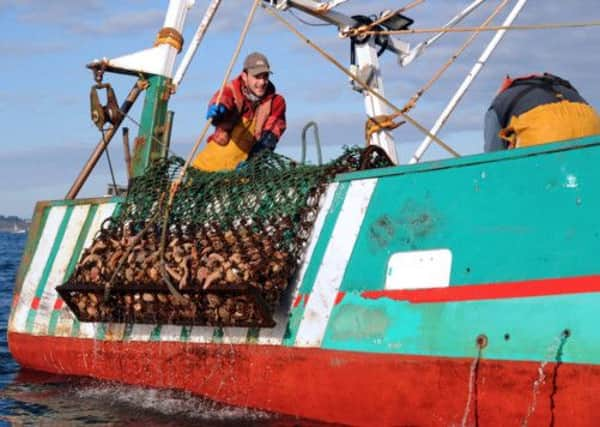Value of Scots fish catches in 2012 falls by 7%


The value of landings in 2011 had been the highest ever recorded.
The report also reveals that the quantity of fish landed increased by one per cent to 363,800 tonnes.The tonnage of pelagic fish, such as herring and mackerel, increased by four per cent, while shellfish landings fell by five per cent. The tonnage of white fish species landed was similar to 2011.
Advertisement
Hide AdAdvertisement
Hide AdA Scottish Government spokesman said: “The overall value of pelagic landings decreased by ten per cent to £166 million, driven by a 20 per cent decrease in the total value of mackerel compared with 2011. This decrease in mackerel value resulted from an eight per cent decrease in the volume landed and a 13 per cent decrease in the price. There were also observable changes in the split between domestic and foreign landings.
“Despite the decrease in price of mackerel landed abroad, the total value of these landings increased by 10 per cent, to £73 million, due to an 18 per cent increase in the quantity landed. The total value of mackerel landed in the UK decreased by 40 per cent to £58 million. In contrast, herring landed in the UK experienced a marked increase in value of 71 per cent compared with 2011, reaching £29 million. Fifty-four thousand tonnes of herring was landed in 2012, an increase of 44 per cent, and the average price increased by 19 per cent.”
He added: “Despite the reduction in the total value of mackerel from 2011, it is still the most valuable stock to the Scottish fleet, contributing 28 per cent to the total value of all stocks. Nephrops (prawns) remains the most valuable shellfish and second most valuable stock, contributing 18 per cent to the total. Haddock is the most valuable demersal fish to the Scottish fleet.”
The report reveals that the number of fishing vessels based in Scotland fell by 51 during the year to 2,044 - the lowest total of the decade. At the end of 2012, the number of fishermen employed on Scottish fishing boats had decreased by five per cent from 2011. Of the 4,747 fishermen still in the industry 3,752 were regularly employed whilst 941 were employed irregularly and 54 were crofters.
Richard Lochhead, the Fisheries Secretary, said: “These statistics show that overall the volume of landings from the Scottish fleet held up well in 2012 despite the currently austere economic trading conditions. Whilst the value of those landings dipped slightly compared with the previous year, given global market conditions, I’m glad to see it still remained second highest in the past 10 years.
“Higher quotas also helped to increase landings values in key stocks such as haddock and whiting. The tough market conditions we are currently experiencing demonstrate the importance of adding value to the Scottish product and promoting it to markets both at home and across the world, an area in which we continue to work actively with the industry.”
Bertie Armstrong, chief executive of the Scottish Fishermen’s Federation, said the latest statistics highlighted the “extremely difficult marketing conditions” and low quayside prices being endured by the Scottish fleet.
He continued: “It should not be forgotten that this fall in the overall value comes at the time when the Scottish fleet is facing spiralling operational costs, including high fuel prices. Our fishing boats also have to adhere to incredibly tight restrictions on the number of fishing days allowed, which means that a good proportion of the fleet is teetering on the brink of economic viability.
Advertisement
Hide AdAdvertisement
Hide Ad“The figures highlight more than ever the need for UK consumers to throw their support behind the fishing industry and buy more home-caught seafood, especially since Scottish fish is the sustainable choice with fishing pressure being at a record low and most stocks increasing.”
Mr Armstrong added: “While it is important that we have a fleet size that is in line with the available catching opportunity, the dwindling employment levels in fishing is a worrying trend and another indicator of the extreme economic pressures being faced by the industry. Our fishing sector supports crucial jobs for many coastal communities and provides an incredibly important renewable food resource, and all efforts must be maintained to ensure there is a viable future for the industry.”